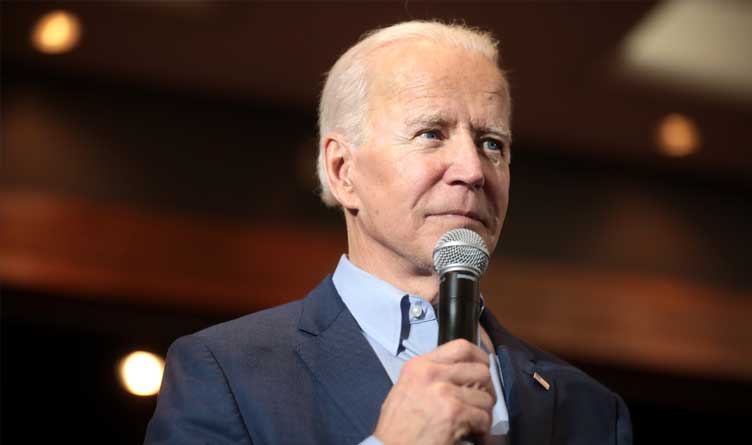As President Joe Biden’s $1.9 Trillion Coronavirus Relief Bill Heads To His Desk This Week, His Administration Is Preparing To Introduce A Massive Infrastructure Relief Bill Sometime This Month. If Biden Can’t Drum Up Bipartisan Support For His Bill, Democrats Would Have To Use The Budget Reconciliation Process To Pass The Bill With A Simple Majority And No Filibuster. While Biden Has Vowed To Push For Bipartisan Cooperation, Senate Democrats Already Resorted To Using The Rule To Pass His $1.9 Trillion Coronavirus Relief Bill.
Photo: Joe Biden speaking with supporters at a community event at Sun City MacDonald Ranch in Henderson, Nevada.
Photo Credit: Gage Skidmore / CC
Published March 11, 2021
The Center for Responsive Politics [By Krystal Hur] –
As President Joe Biden’s $1.9 trillion coronavirus relief bill heads to his desk this week, his administration is preparing to introduce a massive infrastructure relief bill sometime this month.
During the 2020 election, Biden ran on his Build Back Better plan that promises to create “the jobs we need to build a modern, sustainable infrastructure now and deliver an equitable clean energy future.”
While the plan is priced at around $2 trillion dollars, the White House has not yet decided on the package’s exact size.
The recent snowstorm in Texas that left millions without power and dozens dead highlighted the need for an infrastructure overhaul, some say. But the United States’ crumbling infrastructure has long been a pressing national issue.
The American Society of Civil Engineers gave American infrastructure a cumulative C- grade on its 2021 Report Card, citing frequent water main breaks, poor road conditions and more. The organization is currently running online advertisements in Washington, D.C., calling for infrastructure legislation.
Recent Biden hires suggest that the president is gearing up to tackle infrastructure issues. The White House recently hired three women for the National Economic Council perceived to be focused on infrastructure: Elisabeth Reynolds is principal research scientist at the Massachusetts Institute of Technology and executive director of the school’s Industrial Performance Center. She is joined by Massachusetts Bay Transportation Authority official Samantha Silverberg and former Consumer Financial Protection Bureau administrator Leandra English.
Biden met with Transportation Secretary Pete Buttigieg and eight members of the House Transportation and Infrastructure Committee on March 4 to discuss the impending infrastructure package. Biden previously met with a group of senators on Feb. 11 to discuss infrastructure concerns.
According to the Associated Press, Biden stated that the Thursday meeting with lawmakers was about “what we’re gonna do to make sure we once again lead the world across the board on infrastructure,” adding that “it not only creates jobs, but it makes us a helluva lot more competitive around the world if we have the best infrastructure.”
Rep. Sam Graves (R-Mo.), a lawmaker present at the Thursday meeting with Biden in the White House, told The Hill, “I thought it was good, it seemed to be productive. The president was very engaged and very open. Nobody got into any fights.”
Big business and unions want infrastructure bill
Many business groups have urged the Biden administration to pass sweeping infrastructure changes.
On Feb. 17, the U.S. Chamber of Commerce-spearheaded campaign, Build by the Fourth of July, sent Congress a letter urging it “to enact a fiscally and environmentally responsible infrastructure package that stimulates the economy and improves the quality of life for every American” by July 4.
The initiative has gained 310 partners, including the American Public Transportation Association and the American Society of Civil Engineers, since Feb. 22.
The U.S. Chamber of Commerce spent nearly $82 million lobbying in 2020 and undertook several infrastructure-related issues such as transportation. The big business group regularly tops all lobbying spenders, but was the No. 2 spender in 2020.
Laborers make up a key part of Biden’s base, and many groups that represent them have rallied for an infrastructure overhaul.
Biden and Vice President Kamala Harris met with leaders of the American Federation of Labor and Congress of Industrial Organizations (AFL-CIO), AFL-founded North America’s Building Trades Union and other unions on Feb. 17 to discuss coronavirus relief and infrastructure. The meeting appeared to be cordial.
AFL-CIO President Richard Trumka, who last month expressed disappointment that Biden canceled permits for the Keystone XL pipeline, tweeted after the meeting that it was “the most productive Oval Office meeting in years.” AFL-CIO spent about $5.3 million on federal lobbying efforts in 2020.
Anticipated strife between parties
Republicans and Democrats have long sparred over how to tackle infrastructure issues.
Former President Donald Trump blamed House Democrats for not being able to follow up on his 2016 promise to pass infrastructure relief legislation during his years in the White House, making his administration the butt of the “infrastructure week” joke.
Last summer, a $1.5 trillion dollar infrastructure plan to spend billions on clean energy projects, low-income schools and more, passed the House Democrats but was struck down by the Senate Republicans.
Biden’s infrastructure relief package will likely be met with mixed reactions from both sides of the aisle, with its key tenet of addressing climate change expected to cause the most friction.
While lawmakers including Rep. Alexandria Ocasio-Cortez (D-N.Y.) and Sen. Bernie Sanders (I-Vt.) have long championed sweeping legislation to address sustainability issues such as environmental racism, Republicans remain more skeptical.
Graves said in a statement that “a highway bill cannot grow into a multi-trillion dollar catch-all bill, or it will lose Republican support… Republicans won’t support another Green New Deal disguising itself as a transportation bill.”
If Biden can’t drum up bipartisan support for his bill, Democrats would have to use the budget reconciliation process to pass the bill with a simple majority and no filibuster.
While Biden has vowed to push for bipartisan cooperation, Senate Democrats already resorted to using the rule to pass his $1.9 trillion coronavirus relief bill.
Sen. Joe Manchin (D-W.Va.) told Axios that he would help block Biden’s infrastructure package if Republicans aren’t happy with it, adding that he will support tax increases to help pay for the plan.
He also said he believes he will be able to use his position as Energy Committee chairman to sway Republicans’ stances on climate change issues. “I’m not going to do it through reconciliation.” Manchin said. “I am not going to get on a bill that cuts them out completely before we start trying.”






